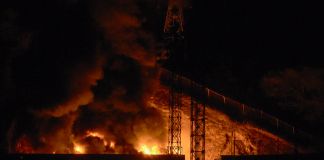Mohsen Mahdawi
I really want to go all the way back to 1948. I am carrying the story, hopes, and struggles of my ancestors. And 1948 was a disaster year for the Palestinian people and for my family, who resided in a town called Umm Khalid (Netanya now), just a few miles away from the Mediterranean Sea. Zionist militias attacked the town and my family were exiled. They were told that it was going to be a couple of weeks before they could return. It’s seventy-six years later and we are still waiting for that return. In the aftermath of that Nakba, I was born and raised in a refugee camp in the West Bank called Al-Far’a. It’s in the north of the West Bank between Jenin and Nablus.
I am the oldest of eight siblings. Growing up in a refugee camp of about sixty-one acres with ten thousand people roughly on it, you hear your neighbors, you smell the food in the neighborhood. There is no privacy, no place for kids to play. We went to United Nations Relief and Works Agency for Palestine Refugees schools and received basic services there. But the depth of the suffering is not necessarily only because of the conditions of being in a refugee camp, but also the continuous injustice and oppression that the Israeli army and military were imposing on my family and on my people.
I witnessed the second intifada as a child. I was ten years old when it started, and it was a very traumatic experience for me, for many other children, and for the Palestinian people. I saw my best friend killed in front of my eyes when I was a child. He was shot by an Israeli soldier in his chest and he fell dead. He was fourteen years old, I was twelve. My uncle was killed on my birthday. He was shot twice in the head and once in the shoulder. I was expecting to celebrate with him that day, my eleventh birthday, and unfortunately, instead of celebrating, I went to my uncle’s funeral. I lost two cousins. I saw neighbors being killed. I was shot when I was fifteen years old.
I witnessed the trauma of sensing that you might be killed or the trauma of sensing that somebody who you deeply love and care for might get killed, of waking up in the middle of the night to explosions that shake every atom of your body. We continued witnessing the apartheid system, where Palestinians are not treated as humans. Everyone in my family who was killed was killed without a court order and without any level of evidence, and whoever killed them never faced justice.
The freedom of travel was heavily restricted. For example, I did not see the sea until my twenties, even though the Mediterranean sea is about an hour and a half by car from Al-Far’a. Growing up during the second intifada, the whole West Bank was fractured and checkpoints were everywhere. We were not able to visit our relatives; I was not able to go and visit my mother, who was in a different area, for three years. When I finally saw her, I actually did not recognize her — my own mother.
Since October 7, four of my cousins have been killed. One of them was shot in front of his children in his chest, and his brother was killed in front of him and in front of his nephews and nieces in the refugee camp.
What fueled and motivated me to do the work that I am doing, and what brought me to Columbia, is this passion to end the war, the injustice, and the occupation — and to create a peaceful future for the children so they don’t have to go through a similar pain, a similar level of suffering that I went through.
Great Job Mohsen Mahdawi & the Team @ Jacobin Source link for sharing this story.





